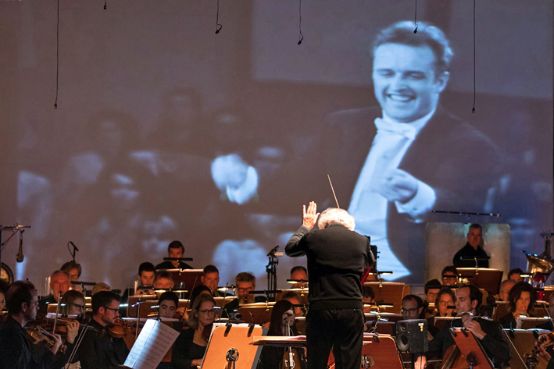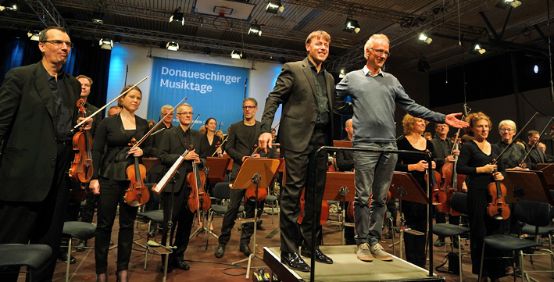Happiness and melancholy
The Donaueschingen Music Days 2019 were fun this time, indeed - and some people will certainly frown at that. But there was still enough serious stuff. Remarkable things from an extremely rich program.

Donaueschingen is a grab bag. Even festival director Björn Gottstein can only influence what comes out of it to a limited extent. And that was particularly evident this year, right from the opening concert. It began with a kind of table bomb: Happy, happy, joy, joy is what the Australian Matthew Shlomowitz calls his attempt to compose happy music, with lots of keyboard sounds and allusions to light music, playful, cheeky, quirky and also a little rough, yes, it could have been more refined and refined, but it gave the festival a direction: towards entertaining music, which is rather rare in these circles.
His piece was topped in the same concert by the Trio for big band, choir and orchestra by the Dane Simon Steen-Andersen. These three bodies of sound were joined by a video. It was the starting point of the piece. Steen-Andersen went down into the archives of Südwestrundfunk and watched hundreds of hours of music film recordings, including symphony and choir concerts, but also rehearsals with conductors such as Sergiu Celibidache and Carlos Kleiber, as well as jazz concerts with Duke Ellington, for example. He has filtered out the tiniest snippets, words, notes and chords, and reassembled them into a coherent musical sequence. Two notes from a jazz bassist, for example, merge into "Till Eulenspiegel" or a conductor's commentary. At the same time, the "KomPonist" has notated these snippets, transformed them into a score and given them to the three orchestras for live performance. For example, the music switches back and forth between orchestra and film soundtrack at a horrendous tempo. It was a virtuoso performance, perhaps a little redundant towards the end, but in any case a great amusement.
The composer actually composes less in the conventional sense than by taking something that already exists and placing it in a new context. It is a reflex to the sampling technique. What was new here was that the sampled material was not only played back, but also transcribed and transformed. This year, a number of composers followed this working model in their own independent way. Gordon Kampe asked members of a church choir to sing songs from their childhood to him and wove them into his ensemble piece Remember Me one. Canadian Nicole Lizée used the noises and sounds of the defective appliances in her father's electrical store to create a Sepulchre - and the Swiss composer Michael Pelzel transferred the tolling of the dead from Varanasi in India to the orchestra. Melancholy slowly mingled with the amusement. It is a game of self-reference and intertextuality. At times, one might think that the composers distrust the invention of sounds and prefer to recompose what already exists.
*
It was as if they were solemnly attending a Sunday service: the composer and his family under two large dark umbrellas on their way from the hotel to the concert. What followed resembled a high mass of sound in an almost cathedral-like, albeit not very high concert hall, almost monumental, carried by a faith in sound that seemed almost lost in the other concerts. With his Poética del espacio created the most expansive work of the festival, an exploration of sound space in various directions, multi-layered in space, with wonderful passages, at best, if you look at the sound-gestural detail, almost a little old-fashioned. Yes, I asked myself again: on what level can the sound still renew itself?
-

Alberto Posadas: "Poética des espacio" Photo: SWR/Lukas Beck
The Swiss participation this year was pleasing. In addition to Pelzel, there was a lively clarinet concerto by Beat Furrer, which, however, was not completed and could only be partially premiered. In the end, the festival ended in melancholy without sinking into it. A delicate and heterogeneous orchestral landscape called Sound Gate was presented by Lidia Zielińska from Poland. At the very end, there were the quiet ones, leaning towards silence Elemental realities by Jürg Frey from Aarau. Elementary indeed, tones, motifs, chords in often steady movement, over half an hour long and yet also making you forget the time. Sometimes almost inaudible - and surprising, because the many tonal elements caught the ear, as if a late Mahler Andante wanted to continue into Feldman, even Pärt. And then into the free.
-

"Elemental realities" by Jürg Frey (right) at the closing concert. Photo : SWR/Astrid Karger








